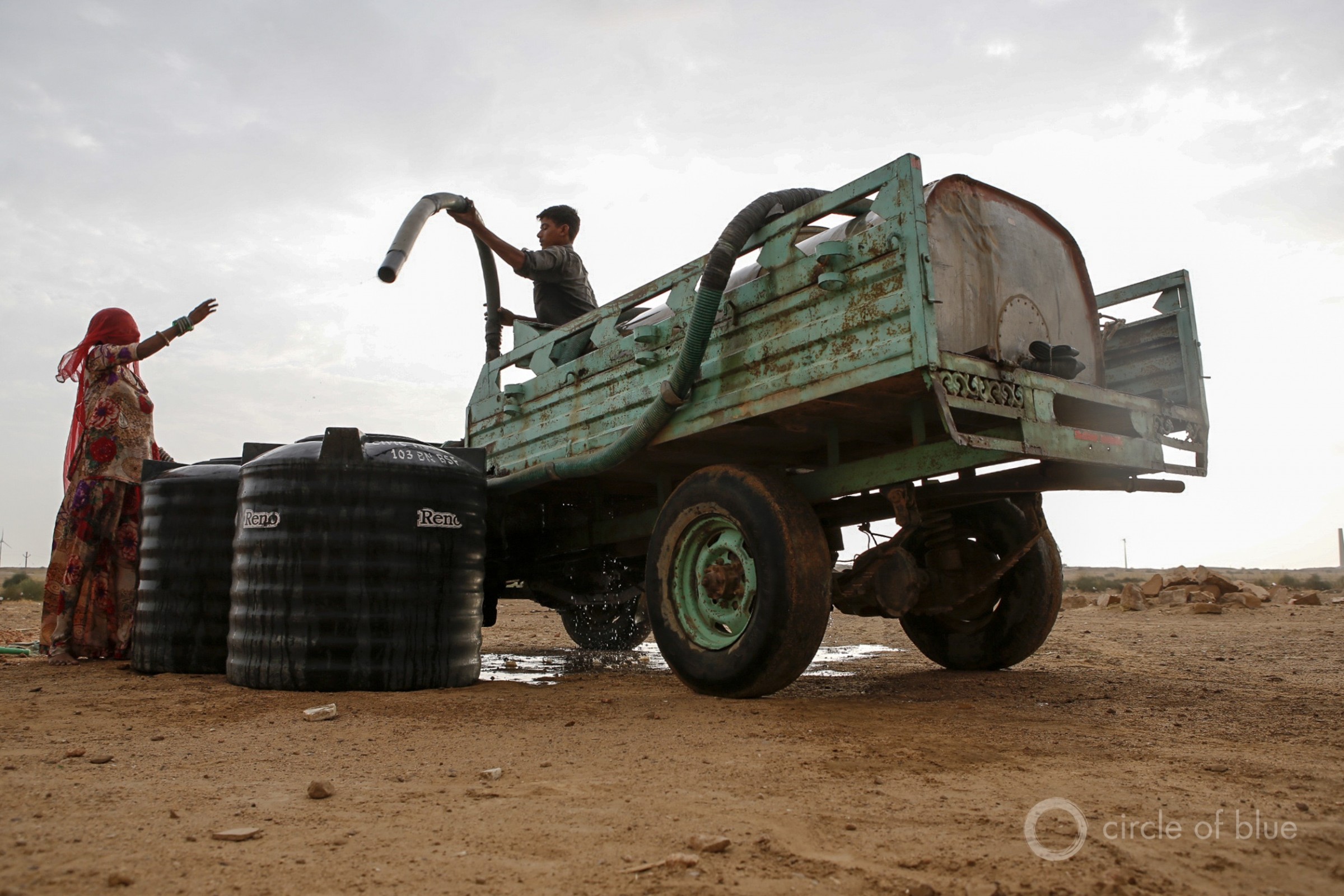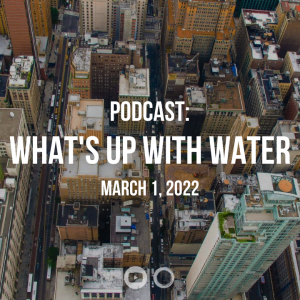Scientific body warns of ‘rapidly closing window’ for action

A woman reaches for a hose from a water tanker in Rajasthan, India. Temperatures on this day in July 2016 exceeded 110 degrees Fahrenheit. Photo © J. Carl Ganter/Circle of Blue
By Brett Walton, Circle of Blue – March 1, 2022
The United Nations climate panel issued a blunt and urgent warning to the world on Monday. In summarizing its report on the consequences of climate change, the scientific body described a society running out of time to prevent unbearable damage to the planet’s lands and waters — and to the people and creatures that depend on them.
“The scientific evidence is unequivocal,” said Hans-Otto Pörtner, co-chair of the IPCC working group that produced the report. “Climate change is a threat to human well-being and the health of the planet. Any further delay in concerted global action will miss a brief and rapidly closing window to secure a livable future.”
Burning fossil fuels, cutting down forests, raising livestock, making cement, and using synthetic fertilizers are among the actions that have increased the amount of heat-trapping gases in the atmosphere to the point that the planet’s basic functions are coming undone.
This IPCC report, one of eight to be published in the sixth assessment cycle, examined the societal risks and vulnerabilities from a changing climate. More than any previous IPCC report, it cast a light on the intersections between climate, communities, and economies, recognizing that risk from warming temperatures is not evenly distributed around the world.
To right those inequities, the report urges leaders to quicken the pace of emissions reductions as well as adaptation to expected environmental changes. “It emphasizes the urgency of immediate and more ambitious action to address climate risks,” said Hoesung Lee, chair of the IPCC. “Half measures are no longer an option.”
The IPCC, which includes hundreds of climate experts, does not conduct original research. Instead it evaluates and synthesizes the current state of knowledge about climate change.
Some of the biggest risks and opportunities identified in the report center on water. Here are six key water-related findings:
- Climate Impacts Are Accelerating
The water cycle is speeding up. Warming temperatures are causing rapid shifts between wet and dry, flood and drought.
These impacts are not linear — they accelerate with more warming. Unless people adapt to rapid environmental change and greenhouse gas emissions are slowed, the risks to biodiversity, water security, food production, infrastructure stability, and health are much higher toward the end of the century.
- We’re Making Them Worse
Cities blanketed with pavement. Homes built in flood plains. Forests uprooted for cattle grazing. Rivers and lakes overloaded with nutrients.
Climate change is bad enough, but human actions are making the fallout worse.
Hard surfaces and channelized rivers increase flood peaks. New developments in flood plains put more people at risk of high waters. Cutting down trees in Brazil’s Amazon region is threatening to destabilize moisture feedbacks that nourish the iconic rain forest. Warmer lake temperatures mean less dissolved oxygen in the water and more algae blooms, which are a problem for fish and swimmers, as well as for drinking water systems.
- Food and Water Security Are in Jeopardy
Warming temperatures are melting the world’s glaciers, causing an irreversible loss of high-mountain water storage. Rising seas are pushing salt water into coastal aquifers, spoiling a source of fresh water for hundreds of millions of people. Rainfall in the Mediterranean and U.S. Southwest is becoming more variable. All these changes in water supply are a major stressor for the sector that consumes more water than any other: agriculture. Warmer temperatures and more severe droughts are already slowing the growth in crop yields.
- Human Health Is At Risk
Vector-borne diseases like malaria and dengue fever are expected to increase as mosquitoes expand their range outside the tropics. Droughts and floods are forcing people to flee their homes. Meanwhile, extreme weather like the Millennium drought in Australia has been shown to trigger anxiety and worsen mental health.
- Some People Are More Vulnerable Than Others
Not all people are exposed to the same level of risk. Vulnerability is higher in high-poverty areas, in countries with poor government, and in farming and fishing communities that are more exposed to climate change. The report notes that these vulnerability hot spots are clustered in Africa, South Asia, Central and South America, and small islands like those in the South Pacific.
Those discrepancies can be illustrated in numbers. Between 2010 and 2020, the death rate from floods, storms, and droughts in high vulnerability areas was 15 times higher than in low vulnerability areas.
- There Is Still Time to Act
The report authors were careful to note that the worst potential outcomes of climate change are not a foregone conclusion. There is still time to reduce carbon emissions — though scaling up a low-carbon economy requires marshalling political will, public support, technical expertise, and financing.
The same factors apply to adaptation, especially to water.
“This report also shows that water can be a part of the solution,” said Aditi Mukherji, coordinating lead author for the water chapter.
Mukherji noted that when people adapt to climate change, they are usually responding to changes in water. Adaptation actions such as storing rainwater, reviving the water-trapping capacity wetlands, and conserving water in agriculture not only reduce carbon emissions. They can also help communities persevere in an era of extreme shifts in water supply.
An earlier version of this article incorrectly stated that dengue fever and malaria are water-borne diseases. They are vector-borne.
Brett writes about agriculture, energy, infrastructure, and the politics and economics of water in the United States. He also writes the Federal Water Tap, Circle of Blue’s weekly digest of U.S. government water news. He is the winner of two Society of Environmental Journalists reporting awards, one of the top honors in American environmental journalism: first place for explanatory reporting for a series on septic system pollution in the United States(2016) and third place for beat reporting in a small market (2014). He received the Sierra Club’s Distinguished Service Award in 2018. Brett lives in Seattle, where he hikes the mountains and bakes pies. Contact Brett Walton





